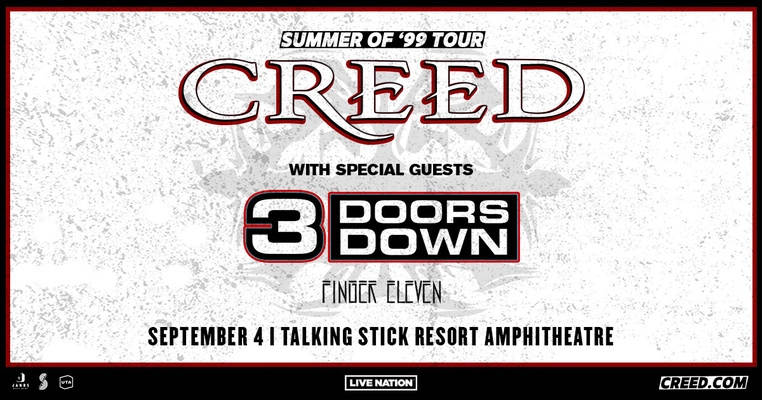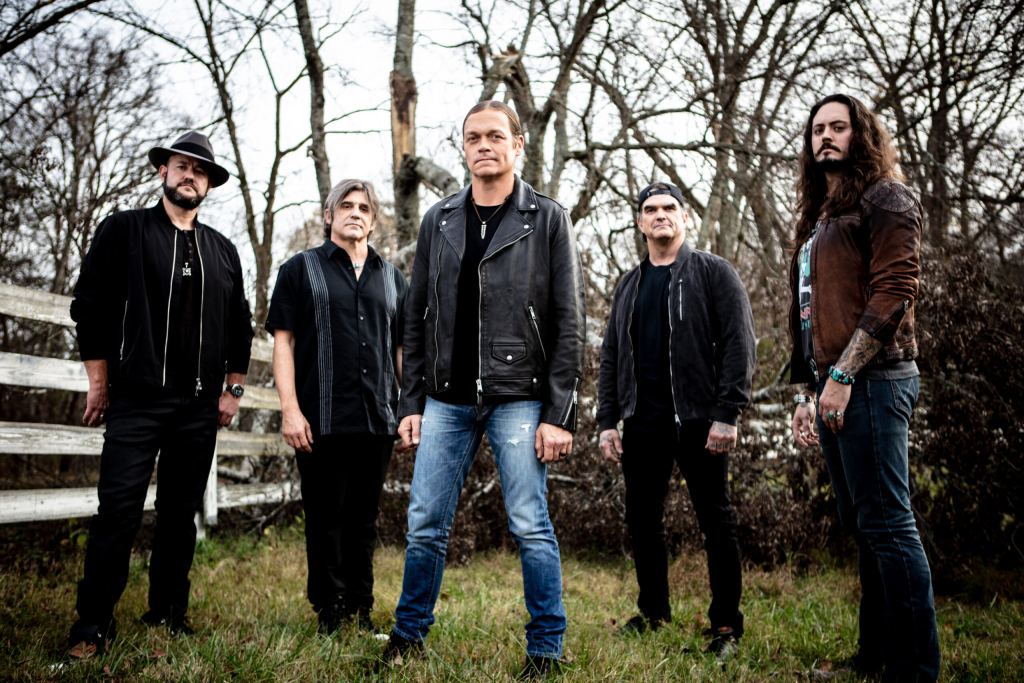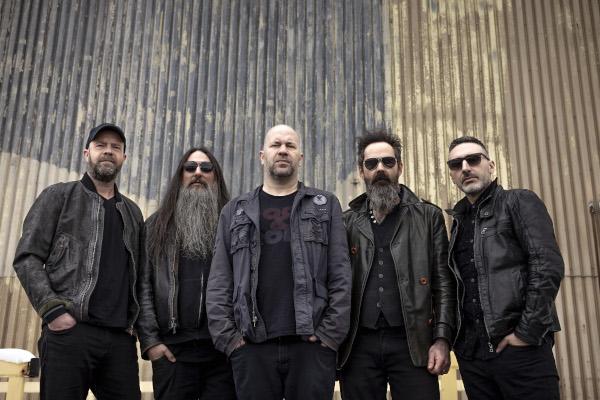
- This event has passed.
Creed + 3 Doors Down at Talking Stick Resort Amphitheatre
September 4 @ 7:00 pm - 11:30 pm

During the late ’90s, Creed emerged from a sea of post-grunge contenders to become one of the decade’s biggest-selling rock bands. At a time when many other Seattle disciples were lapsing into inactivity or experimenting with less commercial sounds, Creed carried the torch of straightforward, grungy hard rock without apology — and they were amply rewarded, selling millions upon millions of albums in just a few years’ time. That success didn’t translate into critical acclaim, however. Many reviewers slammed the band’s music as derivative, and frontman Scott Stapp was a frequent, easy target for publications like Rolling Stone. Based on their frequently spiritual lyrics, some observers deemed Creed part of a new breed of alternative-styled Christian bands, an affiliation that Creed actively tried to downplay. Neither critical jabs nor a potential secular backlash could derail the band, though, and they went into the new millennium as a seemingly unstoppable commercial juggernaut. Ultimately, it was Stapp‘s personal issues that brought an end to Creed’s heyday in 2004. The remaining members partnered with vocalist Myles Kennedy to form Alter Bridge, while Stapp briefly pursued a solo career before reconvening with Creed at the turn of the decade for 2009’s Full Circle. Disbanding again in 2013, they reunited in 2023, riding a wave of attention from sports fans and social media.
Creed took root in 1994 in Tallahassee, Florida. Founding members Scott Stapp and guitarist Mark Tremonti had been classmates in high school and both attended Florida State University, where Stapp studied law before dropping out to pursue music (a decision that led to conflict with his anti-rock & roll parents, as his father was a Pentecostal minister). Stapp and Tremonti began writing songs together, many of which obliquely addressed themes of Christian spirituality, and added a rhythm section consisting of bassist Brian Marshall and drummer Scott Phillips. As an alternative to the band’s original moniker (Naked Toddler), Marshall suggested the name Creed, having previously played in another band dubbed Mattox Creed.
Now boasting a new name and a muscled, modern rock sound, Creed went on to form their own label, Blue Collar, before entering the studio in 1997 with producer John Kurzweg. Recorded on a shoestring budget of $6,000 and initially self-released in a limited run, their debut album, My Own Prison, was soon picked up by Wind-Up Records — a fledgling imprint with distribution through Sony — and treated to a beefy remix that gave it a heavier, radio-friendly punch. The trick worked, as My Own Prison subsequently spun off no less than four number one singles — “My Own Prison,” “Torn,” “What’s This Life For,” and “One” — on Billboard’s mainstream rock radio charts, making Creed the first band to accomplish the feat with its debut album. My Own Prison proved to be extremely popular, moving over five million copies over several years’ time despite little MTV exposure or media coverage.
Although Creed saw a good deal of competition from their post-grunge contemporaries, the band’s sophomore album demonstrated their staying power. Released in the fall of 1999 (when tracks from My Own Prison were still peppering the Billboard charts and radio playlists), Human Clay turned out to be a blockbuster, entering the charts at number one and selling a whopping ten million copies over the next two years. The album’s leadoff single, “Higher,” spent a record-breaking 17 weeks at number one on rock radio, and the follow-up singles “What If” and “With Arms Wide Open” topped the chart as well. This gave the band seven consecutive chart-topping hits on rock radio. “With Arms Wide Open” also gave Creed their first number one pop hit; several months later, the song won a Grammy for Best Rock Song.
During the summer of 2000, bassist Brian Marshall made headlines for criticizing Pearl Jam‘s recent songwriting style during a radio interview; he later apologized, and Stapp distanced the rest of the band from Marshall’s comments on Creed’s website. Months later, as the band readied itself for an American tour, it was announced that Marshall was no longer a member of Creed. He was quickly replaced by touring bassist Brett Hestla (also of Virgos Merlot) and later formed a new band, Grand Luxx, with his old bandmates from Mattox Creed. That same summer, Stapp was goaded into a brief media feud with Limp Bizkit frontman Fred Durst, who launched into a profane tirade against Stapp at a summer festival that both bands were playing. Although Stapp later blasted Durst‘s business tactics (as senior VP at Interscope), claiming they stemmed from a “mobster mentality,” things soon reverted to normal as the band returned to the studio.
Creed worked on their new album for much of 2001; although Hestla remained in the touring lineup, Tremonti chose to handle the bass parts himself, preserving the band’s initial core. Weathered was then released in November 2001, entering the charts at number one and tying a record (among other number one debuts) by remaining there for eight straight weeks; during that two-month time, it also sold a staggering five million copies. The first single, “My Sacrifice,” was a Top Five pop hit that spent nine weeks atop the rock radio charts. “One Last Breath” also demonstrated the band’s crossover appeal by faring well on both charts.
Stapp was involved in a car accident in April 2002 and suffered both a concussion and vertebrae damage. Creed initially canceled the rest of their tour, but Stapp recovered quickly, allowing the band to reschedule most of their show dates during the summer. Stapp‘s health was slipping in other ways, however, as he developed an addiction to Percocet and began taking a host of other medications on the road, including Xanax and throat steroids. The tour concluded with an infamous performance in Chicago, during which an obviously intoxicated Stapp performed one song while lying on his back. Such problems quickly led to the band’s unraveling.
Wind-Up Records officially announced the breakup of Creed in June 2004. Over the course of ten years, the band had sold over 30 million albums worldwide and became one of the biggest touring draws of the ’90s. Founding members Mark Tremonti, Scott Phillips, and Brian Marshall went on to form Alter Bridge with ex-Mayfield Four frontman Myles Kennedy. Scott Stapp went on to issue a solo record, 2005’s The Great Divide, which included a collection of rock songs inspired by Mel Gibson’s Passion of the Christ.
Three years later, Stapp and Tremonti reconvened in Florida, where they began to reconcile past differences. Shortly thereafter, the two persuaded Scott Phillips and original bassist Brian Marshall to band together once again, thus cementing Creed’s reunion. They booked a series of shows for the summer of 2009 in support of the album Full Circle, which was released later that year. The band’s first concert recording, Creed Live, was released at the end of the year. Touring continued into 2012 and the group went on another extended break in 2013. Various solo and side projects occupied bandmembers over the next decade.
Late into their hiatus, “Higher” became an unexpected standard for American sports teams such as the Texas Rangers and Minnesota Vikings — Creed even appeared at a 2023 Rangers playoff game — while social media, whether ironically or not, embraced the band’s more inspirational singles. The surge generated by all that attention helped push the group back into the public discussion. Seizing the moment, Creed announced their official reunion and an extended 2024 tour. ~ Andrew Leahey & Steve Huey, Rovi

A subsidiary of Universal, Republic Records signed the musicians and issued their major-label debut, The Better Life, in early 2000.
The Better Life became one of the biggest-selling albums of 2000, going platinum four times during its first year of release and spawning several singles. The band furthered its success with 2002’s Away from the Sun, which debuted at number eight on the Billboard Top 200 and, like its predecessor, climbed to multi-platinum status. 3 Doors Down toured steadily throughout 2003 and 2004 in support of Away from the Sun, and issued the live EP Another 700 Miles in November 2003 as a holdover between studio efforts. The group returned with a heavier album, Seventeen Days, in early 2005. It debuted at number one on the Billboard 200 and went platinum in its first week of release. A self-titled album, which followed in May 2008, repeated its predecessor’s success when it too debuted at the top of the Billboard 200.
3 Doors Down toured throughout 2009, released a digital-only acoustic holiday album at the end of the year, and began to work on their next album in 2010. With Howard Benson serving as producer, the guys shuttled themselves between L.A. and Tokyo, recording the album in both cities and eventually emerging with 2011’s Time of My Life.

2024 has been a full circle moment for Finger Eleven. After 25 years, the Juno Award-winning band are criss-crossing America again with their long time labelmates Creed on the current Summer of ‘99 arena tour. They are working on their first new album in nearly a decade, and they sense that a big rock revival is brewing. Believe it or not, Finger Eleven have been around since 1990. Back in high school, founding members Scott and Sean Anderson (vocals and bass), and guitarists James Black and Rick Jackett formed the band with original drummer Rob Gommerman. They became Rainbow Butt Monkeys. With their blend of ‘90s alt and funk-rock, the Canadian upstarts signed to Mercury and released Letters From Chutney in 1995. But the quintet realized they needed a new name and shift in the direction. Thus Finger Eleven was born. They transitioned into a post-grunge and nu-metal influenced phase on their first two albums, Tip (1997) and The Greyest of Blue Skies (2000).
Their mainstream breakthrough came with their self-titled album. Produced by Johnny K (Disturbed, 3 Doors Down), this 2003 release marked a shift with the acoustic ballad “One Thing” which showcased a new side of the band and helped push album sales higher. They have two gold albums in the States and two gold and two platinum albums in Canada.
